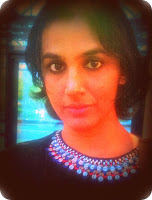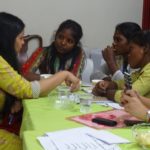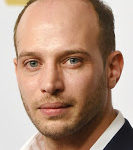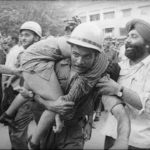The Dove’s Lament: Interview with Kirthi Jayakumar, Author, Lawyer and UN Activist.
For the Sake of Argument catches up with the multi-talented, Kirthi Jayakumar, Co-Founder of the international law journal, A38, Lawyer at TrustLaw, recipient of the US Presidential Service Award (2012) and author, about her recent publication, “The Dove’s Lament“.
Sourya (S): Firstly, congratulations on your book, “The Dove’s Lament”. Tell us exactly what the book is about?
Kirthi (K): Thanks, Sourya! The book is a collection of 12 short stories (with a short fact sheet following each). Each story chronicles a human narrative set against the larger background of a conflict – there’s the Rwandan Genocide, Kashmir, the Peshawar Attacks, the war in Sri Lanka, the Drug War in Afghanistan, the War Lord culture in Afghanistan and the Israel-Palestine conflict. The idea is to show that there is a human face, a human cost and a human story to war – and to tell the stories that numbers and statistics don’t.
(S): What motivated you to write on this topic? Was this a project you had had in your mind for sometime or did it just come to you one day?
(K): I am always driven by peace, and I’ve always been motivated to study and understand war (Herculean task, yes). In the work I have had the privilege of doing so far in life, I’ve understood that there has been a side to war that the world doesn’t pick up on. We read placid reports in the newspapers, and watch documentaries that tell us one part of the whole thing. We don’t often hear what it feels like to live life while in the middle of a conflict. We don’t often know about how it feels to be in the centre of a conflict and deal with existential issues. This was the idea behind it. As for the idea, since it drives most of my writing and my work, I’d say it’s been in my mind for a while.
(S): Are the characters mentioned in the book real people you have interacted with or are they representatives of the generation living in those crisis zones?
(K): Well, the characters are all fictitious, and the stories and dilemmas are all fiction – but, the conflicts are real.
(S): What lead you to choose those specific zones to write the stories about? How did you go about researching?
(K): I think, to be honest, it was my limited knowledge that made me choose these zones. There are many conflicts in the world and one can only attempt to read about or learn about a few at a time. What I’ve written about are those that I have had the benefit of learning and reading about.
(S): You are a Lawyer for TrustLaw, a Volunteer for the UN, Founder of A38 and The Red Elephant Foundation, among a lot of other thing. How exactly do you manage time between writing and your work?
(K): I don’t look at any of it as work! So whatever I do – writing or any of these amazing opportunities I have had, only feels like fuelling the sole passion I have – which is to create a world that is (relatively more) peaceful.
(S): The intensity and magnitude of difference crisis zones around the world is growing at an alarming rate. What immediate steps, according to you, should be taken to prevent a further slide?
(K): I suppose conflict is inevitable. It is the same logic that tells you that you won’t know what happiness is until you know what sadness is; or what light is, unless you know what darkness is. Be that as it may – since conflict cannot be obliterated, it must be managed. It is imperative that we have a powerful overarching authority that can keep conflict in check, and actually work towards allowing that to manifest.
(S): Can the UN be considered to have ‘failed’ as such? Is it time the World admits that it needs something better?
(K): No, the UN has not failed. Man’s take on it has. We need to rethink the way the UN works – and learn that the world order has changed, and that the way things work should change accordingly.
(S): You have author a book on Public International Law and on Redefining UN Peace Keeping Law. Do you plan to write more academic oriented books soon? Any other books you have in the pipeline at the moment?
(K): Yes indeed! I love writing these books because I learn a lot in the process. Right now, I am working alongside Justice Kannan of the P&H High Court on a book on Medical Jurisprudence. I have a chapter coming out as part of a Criminology series in a book edited by Dr K Jaishankar. I am also the editor of a book by Demeter Press on Feminist Perspectives of Family. In addition, I’m working on a semi-academic project that looks at how Gender Violence subsists in a Peacetime-Wartime continuum.
(S): What was the reaction you got from people who read, “The Dove’s Lament”?
(K): I’ve loved it so far! People have come back saying that they’ve learned a lot more, and that they would like to act on it – it feels so lovely to know that! Aside of that, I’ve had a lot of kind reviews – one that said it should become mandatory reading for the UN and another that said it was Pulitzer-worthy 🙂
(S): What can the, Governments in general and the youth in specific, around the world do and should do to help those who are suffering in multiple different humanitarian crisis locations?
(K): Know the truth. Act on the truth. Stay true to the goals of being.
You can buy your copy of the book HERE






Leave a Reply